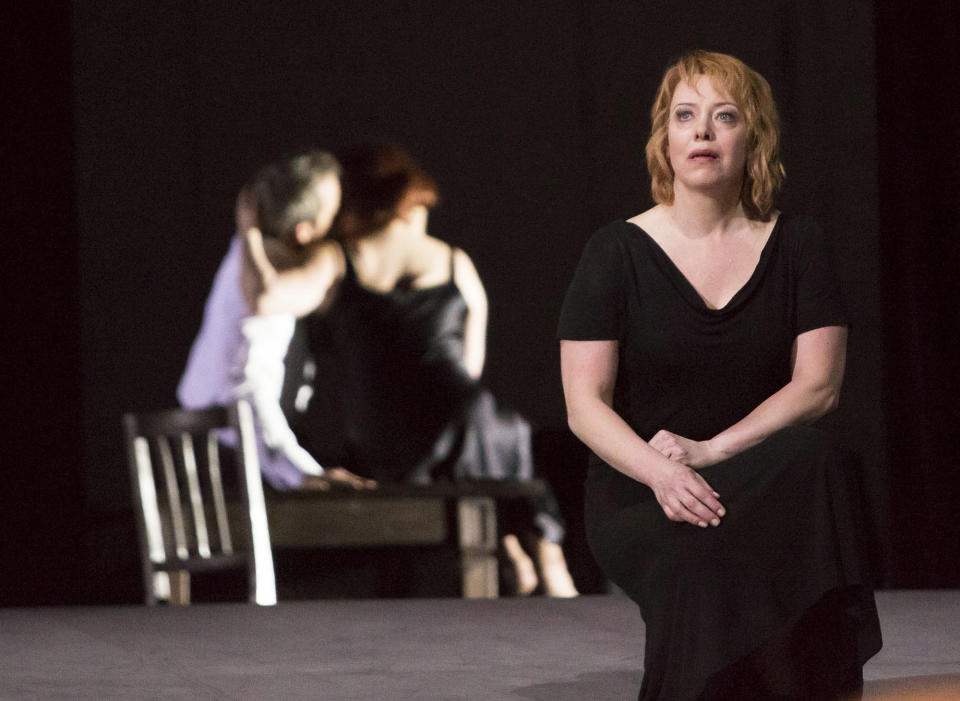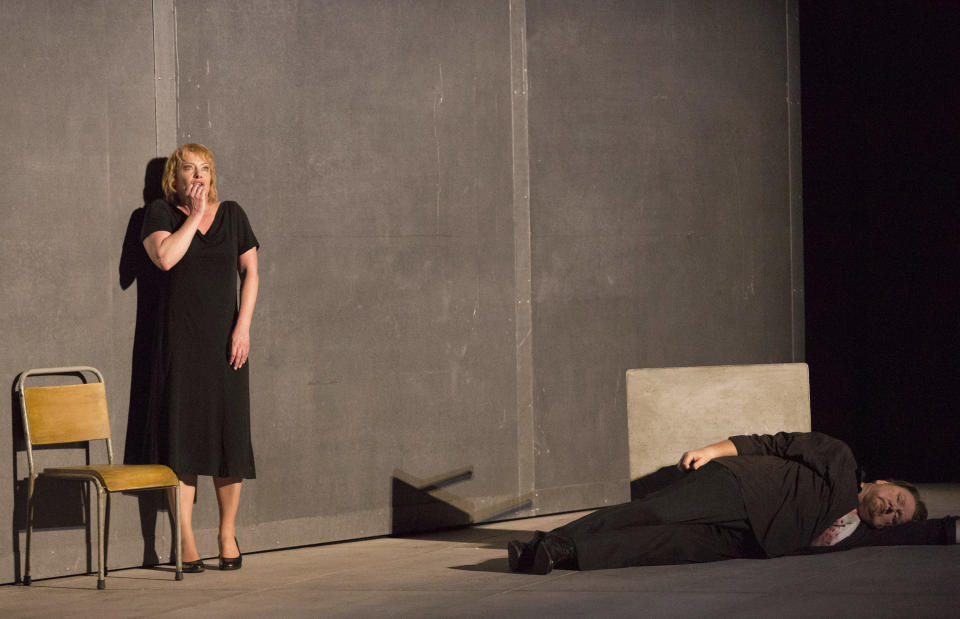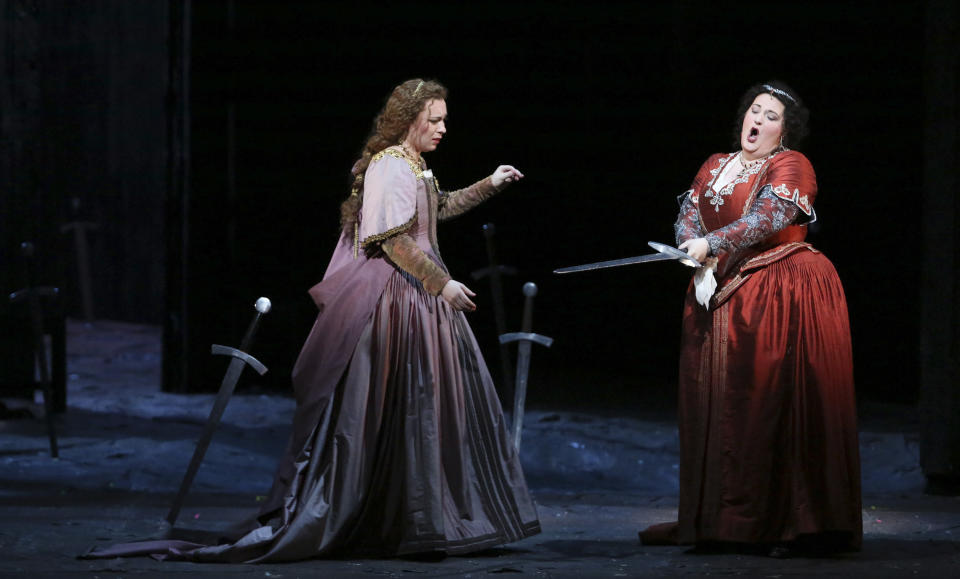Nina Stemme ignites Houston's 'Tristan'
HOUSTON (AP) — Thunderbolts and torrential rains greeted the audience arriving for Wagner's "Tristan und Isolde" at the Wortham Theater Center on Saturday night. Inside the opera house they experienced a different kind of storm — a flood of glorious sound as Nina Stemme unfurled her magnificent voice.
The Swedish soprano gave a performance of overwhelming vocal and dramatic intensity as the Irish princess, from gleaming top notes down to a potent, crystal-clear lower register. Her high C's at the beginning of the love duet in Act 2 rang out with sustained brilliance, and she finished the night with a rapturous "Liebestod," capped by a luminous, lingering, hushed final note.
Stemme, looking glamorous in first a white strapless gown and then a black dress, captured all facets of Isolde's character — her initial rage and contempt, her headlong yielding to passion, and finally her serene transfiguration. The fury she brought to Isolde's Narrative and Curse in Act 1 was chilling, and there was an icy bitterness in the way she spat out the word "knecht" (the equivalent of "lackey") at Tristan. Once she had drunk the love potion, her voice became by turns tender and filled with soaring ecstasy.
Most of all she brought an assurance and sense of inevitability to her performance, managing to make one of the most difficult roles in all of opera sound easy. She does not quite have the superhuman lung power of a Birgit Nilsson (who does?), but Stemme is in every other way a worthy successor to her legendary compatriot.
The Houston Grand Opera surrounded her with a terrific cast, starting with Canadian tenor Ben Heppner as Tristan. Hobbled in recent years by severe vocal problems, he proved at least on this night a worthy partner. His leathery voice rang out with moody expressiveness in Act 1, and he kept pace with Stemme throughout the Act 2 love duet with its many exposed passages. Only near the end of Act 3 did he run into some unsteadiness, but even then he powered through the final moments of delirium with eloquence.
As Isolde's faithful but rather clueless servant, Brangaene, German mezzo-soprano Claudia Mahnke produced ribbons of bright, ardent sound with effortless top notes. German bass Christof Fischesser cut an unusually youthful and animated figure as the cuckolded King Marke and brought a big, burnished sound to his monologue. American baritone Ryan McKinny sang heartily as Tristan's friend Kurwenal, but he seemed to be pushing his attractive voice to its limits.
Music director Patrick Summers drew a rich and exciting performance of the score from the excellent orchestra.
The production by German director Christof Loy was originally seen with the same two leads at London's Covent Garden in 2009. It separates the worlds of external reality and interior consciousness on either side of a red curtain that is pulled open at key moments. This creates some striking images — like the king's retinue gaping in disbelief at the adulterous lovers, who carry on unaware of their presence.
Stemme has been singing Isolde for a decade, but incredibly these are her first performances of the role in the United States. Audiences at the Metropolitan Opera reportedly will finally get to hear her do it in the 2016-17 season.
Meanwhile, her New York appearances are rare — but she managed to squeeze one in on Thursday night between performances in Houston. She flew up to perform at Lincoln Center with the Swedish Chamber Orchestra in an adventurous program that interwove orchestral snippets by the likes of Ravel, Elgar and Brahms with an assortment of songs, mostly about love. These included lieder by Sibelius, Grieg, Strauss and Schubert and, for variety, "The Saga of Jenny," from the Kurt Weill-Ira Gershwin musical, "Lady in the Dark," which Stemme capped off with a roof-rattling high note. Wagner was represented by two of his "Wesendonck-Lieder," whose chromatic harmonies hint strongly at "Tristan."
Back in Houston, on Friday night the company presented its last offering of the season, Verdi's "Il Trovatore," in a staging by Stephen Lawless first seen here in 2005. It's a murky and somewhat static production, with sets by Benoit Dugardyn consisting of fake stone walls and doors that open and slide apart to reveal glimpses of the changing locales.
After a tentative start, Tamara Wilson as Leonora came into her own with an exquisitely precise rendition of "D'amor sull'ali rosee." Mezzo-soprano Dolora Zajick reprised her stentorian Azucena, though holes are now evident between registers and those prolonged trills in "Stride la vampa" sound more like wobbles. Tenor Marco Berti showed glints of vocal subtlety when he wasn't bellowing out Manrico's lines at full volume. Tomas Tomasson was out of his depth as the Count di Luna, bringing a hectoring stridency to some of Verdi's most mellifluous writing for baritone. As Ferrando, Peixin Chen displayed a warm, smooth bass voice. Summers, conducting here as well, never generated the white heat for which this opera cries out.
There are two more performances of "Tristan" through May 5 and five more of "Trovatore" through May 11.



